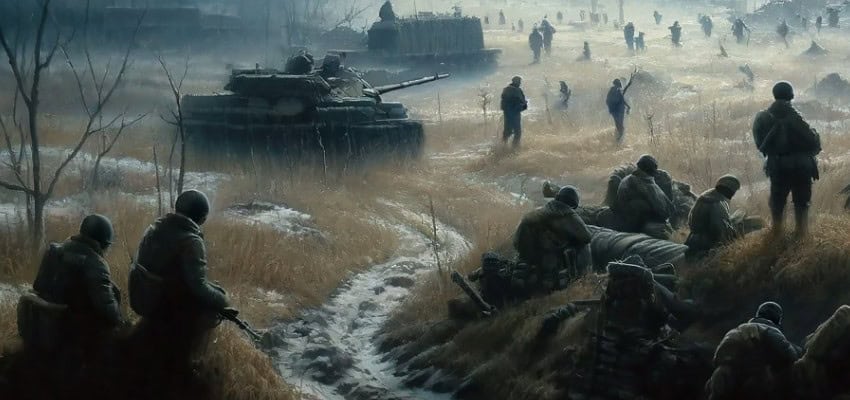Editor’s Note: In the dynamic landscape of the Russo-Ukrainian conflict, the balance of power continues to shift as Russian forces take advantage of a delay in U.S. military support to Ukraine. This update provides a comprehensive analysis of the current strategic maneuvers and potential future developments in the region. As Ukraine prepares for the anticipated summer offensive by Russian forces, the significance of these developments reaches far beyond the immediate battlefield, influencing global security dynamics and strategic decisions of international actors. This briefing is essential for those looking to understand the intricate details of these ongoing military and geopolitical interactions.
Background Note: ComplexDiscovery’s staff offers distinctive perspectives on the Russo-Ukrainian war and Iran-Israel conflict, informed by military experience on the West German, East German, and Czechoslovakian border during the Cold War and in Sinai as part of Camp David Accord compliance activities. This firsthand regional knowledge, combined with proficiency in cybersecurity, information governance, and eDiscovery, enables multifaceted analysis of these conflicts, including the critical impact of cyber warfare, disinformation, and digital forensics on modern military engagements. This unique background positions ComplexDiscovery to provide valuable insights for conflict-related investigations and litigation, where understanding the interplay of technology, data, and geopolitical factors is crucial.
Source Note: One of the most accurate and detailed sources for ongoing updates on the Ukraine crisis is the Russian Offensive Campaign Assessment from the Institute for the Study of War. The Institute for the Study of War (ISW) is a 501(c)(3) organization and produces strictly non-partisan, non-ideological, fact-based research. ISW seeks to promote an informed understanding of war and military affairs through comprehensive, independent, and accessible open-source research and analysis. ISW’s research is made available to the general public, military practitioners, policymakers, and media members. Providing a daily synthesis of key events related to the Russian aggression against Ukraine, ISW updates may benefit investigators and litigators as they follow the business, information technology, and legal trends and trajectories impacted by and stemming from the current Russo-Ukrainian conflict.
For those seeking to grasp the full scope of this evolving landscape, the complete updates from the Institute for the Study of War serve as an invaluable resource.
Content Assessment: Russian Forces Advance as Ukraine Awaits Critical U.S. Aid
Information - 92%
Insight - 90%
Relevance - 90%
Objectivity - 88%
Authority - 94%
91%
Excellent
A short percentage-based assessment of the qualitative benefit expressed as a percentage of positive reception of the recent article by ComplexDiscovery OÜ titled "Russian Forces Advance as Ukraine Awaits Critical U.S. Aid (April 27, 2024)."
Russo-Ukrainian Conflict Update*
Russian Forces Advance as Ukraine Awaits Critical U.S. Aid
ComplexDiscovery Staff
As of April 27, 2024, the strategic landscape of the Russian-Ukrainian conflict continues to evolve. According to military analysts from the Institute for the Study of War, Russian forces are poised to make significant tactical gains in the coming weeks while Ukraine awaits the arrival of critical U.S. security assistance.
Mounting Pressure on Ukrainian Defenses
The delay in the delivery of U.S. military aid has left Ukrainian forces facing mounting pressure from Russian attacks, particularly in the Avdiivka area and near Chasiv Yar in Donetsk Oblast. Although well-equipped Ukrainian troops are expected to prevent Russia from achieving major operational breakthroughs during its anticipated summer offensive, the Russian military is leveraging its advantages in manpower and equipment to pose a serious threat.
Analysts believe that Russian forces have the opportunity to make significant tactical gains in the Avdiivka area and pursue an operationally significant objective with the capture of Chasiv Yar. However, these efforts are unlikely to penetrate Ukrainian defenses significantly in the short term or cause the collapse of the Ukrainian defensive line in Donetsk Oblast.
Russian Military Adaptations and Innovations
The Russian military has demonstrated uneven but persistent adaptations, including changes in operational planning, increased use of glide bombs by aircraft, and the deployment of technological innovations at scale. There are concerns that Russia may time the introduction of new tactical or technological advances to coincide with the start of its summer offensive, exploiting Ukrainian vulnerabilities before Western aid can bolster Kyiv’s capabilities.
Recent Russian Advances and Ukrainian Responses
In recent weeks, Russian forces have made confirmed advances north and northwest of Avdiivka, completely seizing the settlement of Novokalynove, according to Russian military sources. Geolocated footage also showed Russian gains in western Ocheretyne, southwestern Solovyove, and south of Novobakhmutivka.
The tempo of Russian attacks is currently higher around Avdiivka than near Chasiv Yar, as Moscow’s troops focus on exploiting an unfavorable tactical situation for Ukrainian forces northwest of the city. However, analysts predict that Russia is likely to intensify its offensive operations near Chasiv Yar in the coming weeks, potentially using the town as a staging point for subsequent attacks on Ukraine’s critical fortress belt cities of Kostyantynivka and Druzhkivka.
In response to the Russian advancements, the Ukrainian military has strategically deployed additional reserve forces and resources to critical engagement zones. The Ukrainian General Staff has been actively reallocating assets to fortify positions that are under heavy Russian pressure, demonstrating a dynamic and responsive defense strategy aimed at curbing further Russian incursions.
Missile Strikes and Drone Attacks
On the night of April 26-27, Russian forces launched large-scale cruise and ballistic missile strikes against Ukraine, including the apparent resumption of sea-based Kalibr cruise missile attacks after a long pause. Ukrainian Air Force Commander Lieutenant General Mykola Oleshchuk reported that Russia fired a total of 34 missiles, with Ukrainian air defenses intercepting 21 of them. The strikes damaged energy infrastructure facilities in several Ukrainian regions.
Meanwhile, Ukrainian forces conducted successful drone attacks against a Russian airfield and oil refineries in Krasnodar Krai on the same night. Sources told Ukrainian outlet Suspilne that the strikes hit military aircraft, radar systems, and electronic warfare equipment at the Kushchyovskaya airfield, as well as causing damage and fires at the Ilskiy and Slavyansk oil refineries.
Domestic and Regional Developments
Within its borders, Russia continues to tighten control over migrant populations through legislative measures aimed at enhancing national security. Recent bills introduced in the Russian State Duma focus on creating a more stringent deportation regime for migrants, reflecting broader efforts to manage internal demographics amidst the ongoing conflict.
The Kremlin’s influence operations in Moldova, particularly through the autonomous region of Gagauzia, indicate a sustained strategy to destabilize Moldovan advances towards European integration. The recent detentions of pro-Russian figures at Chisinau airport underscore the tense geopolitical tug-of-war between pro-European and pro-Russian factions within Moldova.
The Critical Role of Western Assistance
The latest assessments underscore the critical importance of timely Western military assistance in enabling Ukrainian forces to withstand Russia’s impending offensive. While Ukraine is expected to stabilize the front lines in the coming months and potentially launch limited counteroffensives in late 2024 or early 2025, the outcome will likely hinge on the speed and scale of aid deliveries in the weeks ahead. As the conflict continues to draw in regional and international actors, it reflects a broader geopolitical struggle that extends beyond the immediate territories in contention.
News Sources
- Institute for the Study of War (understandingwar.org)
- Ukrainian Defense at a Crossroads: Anticipating the Impact of $60 Billion US Aid (April 20, 2024) (complexdiscovery.com)
As a leading source for cybersecurity, information governance, and legal discovery insights, including international investigations and litigation, ComplexDiscovery OÜ recognizes the importance of awareness regarding alleged and documented criminal acts, particularly in the context of the Russia-Ukraine conflict. While we, following the lead of the Institute for the Study of War (ISW), do not provide detailed coverage of war crimes in our primary reports, we encourage professionals within the eDiscovery ecosystem to stay informed about these activities. This awareness is crucial for understanding potential future legal actions and responsibilities.
Detailed Reporting with Maps for April 27, 2024, from the ISW – Mouseover to Scroll
2024-04-27-Russian Offensive Campaign Assessment-UpdateReview the Detailed Reporting and Maps PDF
About the Institute for the Study of War Research Methodology
ISW’s research methodology relies on both primary and secondary sources, enabling researchers to develop a comprehensive understanding of the situation on the ground. In order to analyze military and political developments in any given area, ISW’s research analysts must wholly understand the systems of enemy and friendly forces. They must also understand the population demographics, physical terrain, politics, and history of that area. This lays the analytical foundation for understanding the reasons for particular developments and fulfilling their assigned research objectives. ISW analysts also spend time in places like Iraq, Afghanistan, and elsewhere in order to gain a better understanding of the security and political situation and to evaluate the implementation of current strategies and policies. Our researchers compile data and analyze trends, producing a granular analysis of developments in areas of research, producing an accurate, high-resolution, timely, and thorough picture of the situation. ISW’s research methodology guarantees its success and commitment to improving the nation’s ability to execute military operations, achieve strategic objectives, and respond to emerging problems that may require the use of American military power.
About the Institute for the Study of War
The Institute for the Study of War advances an informed understanding of military affairs through reliable research, trusted analysis, and innovative education. We are committed to improving the nation’s ability to execute military operations and respond to emerging threats in order to achieve U.S. strategic objectives. ISW is a non-partisan, non-profit, public policy research organization.
Learn more, get involved, and contribute today.
Additional Reading
- From Dissent to OSINT? Understanding, Influencing, and Protecting Roles, Reputation, and Revenue
- [Annual Update] International Cyber Law in Practice: Interactive Toolkit
- Data Embassies: Sovereignty, Security, and Continuity for Nation-States
Assisted by GAI and LLM Technologies
* Sourced and shared with direct express permission from the Institute for the Study of War (ISW).
Source: ComplexDiscovery OÜ























